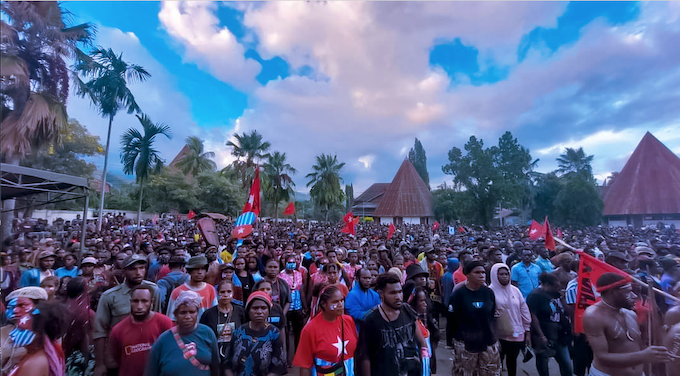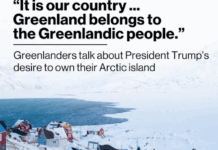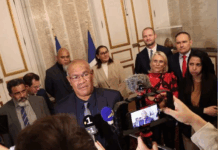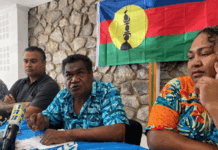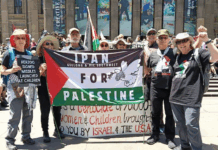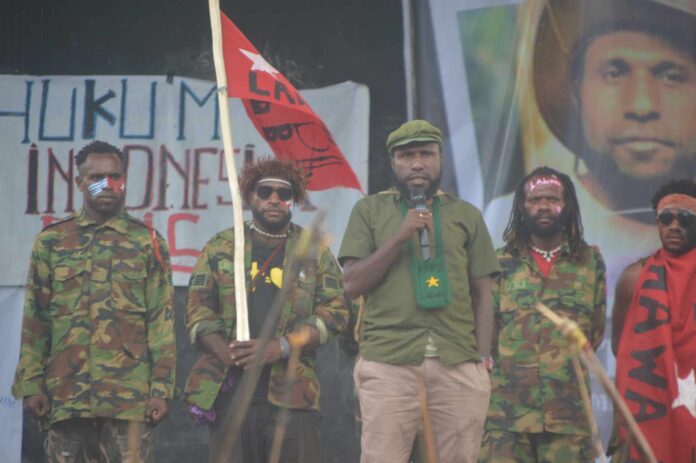
SPECIAL REPORT: By Yamin Kogoya
Prominent West Papuan independence activist Victor Yeimo was yesterday released from prison in Jayapura, Indonesia’s occupied capital of West Papua, sparking a massive celebration among thousands of Papuans.
His release has ignited a spirit of unity among Papuans in their fight against what they refer to as racism, colonialism, and imperialism.
His jailing was widely condemned by global human rights groups and legal networks as flawed and politically motivated by Indonesian authorities.
- READ MORE: Ribuan rakyat Papua sambut Viktor Yeimo di panggung budaya Ekspo Waena, Kota Jayapura
- OPM calls for decolonisation of West Papua, condemns UN ‘collusion’
- Other Victor Yeimo reports
“Racism is a disease. Racism is a virus. Racism is first propagated by people who feel superior,” Yeimo told thousands of supporters.
He described racism as an illness and “even patients find it difficult to detect pain caused by racism”.
Victor Yeimo’s speech:
“Racism is a disease. Racism is a virus. Racism is first propagated by people who feel superior. The belief that other races are inferior. The feeling that another race is more primitive and backward than others.
“Remember the Papuan people, my fellow students, because racism is an illness, and even patients find it difficult to detect pain caused by racism.
“Racism has been historically upheld by some scientists, beginning in Europe and later in America. These scientists have claimed that white people are inherently more intelligent and respectful than black people based on biological differences.
“This flawed reasoning has been used to justify colonialism and imperialism in Africa, Asia, and the Pacific, with researchers misguidedly asserting genetic and ecological superiority over other races.
“Therefore, there is a prejudice against other nations and races, with the belief that they are backward, primitive people, belonging to the lower or second class, who must be subdued, colonised, dominated, developed, exploited, and enslaved.
“Racism functions like a pervasive virus, infecting and spreading within societies. Colonialism introduced racism to Africa, Asia, and the Pacific, profoundly influencing the perspectives and beliefs of Asians, Indonesians, and archipelago communities.
“It’s crucial to acknowledge that the enduring impact of over 350 years of racist ideology from the Dutch East Indies has deeply ingrained in generations, shaping their worldview in these regions due to the lasting effects of colonialism.
“Because racism is a virus, it is transmitted from the perpetrator to the victim. Colonised people are the victims.
“After Indonesia became independent, it succeeded in driving out colonialism, but failed to eliminate the racism engendered by European cultures against archipelago communities.
“Currently, racism has evolved into a deeply ingrained cultural phenomenon among the Indonesian population, leaving them with a sense of inferiority as a result of their history of colonisation.
“Brothers and sisters, I must tell you that it was racism that influenced Sukarno [the first President of Indonesia] to say other races and nations, including the Papuans, were puppet nations without political rights.
“It is racist prejudice.

“There is a perception among people from other nations, such as Javanese and Malays, that Papuans have not advanced, that they are still primitives who must be subdued, arranged, and constructed.
“In 1961, the Papuans were building a nation and a state, but it was considered an impostor state with prejudice against the Papuans. It is important for fellow students to learn this.
“It is imperative that the Papuan people learn that the annexation of this region is based on racist prejudice.
“The 1962 New York Agreement, the 1967 agreement between Indonesia and the United States regarding Freeport’s work contract, and the Act of Free Choice in 1969 excluded the participation of any Papuans.
“This exclusion was rooted in the belief that Papuans were viewed as primitive and not deserving of the right to determine their own political fate. The decision-making process was structured to allow unilateral decisions by parties who considered themselves superior, such as the United States, the Netherlands, and Indonesia.
“In this arrangement, the rightful owners of the nation and homeland, the Papuan people, were denied the opportunity to determine their own political destiny. This unequal and biased treatment exemplified racism.”
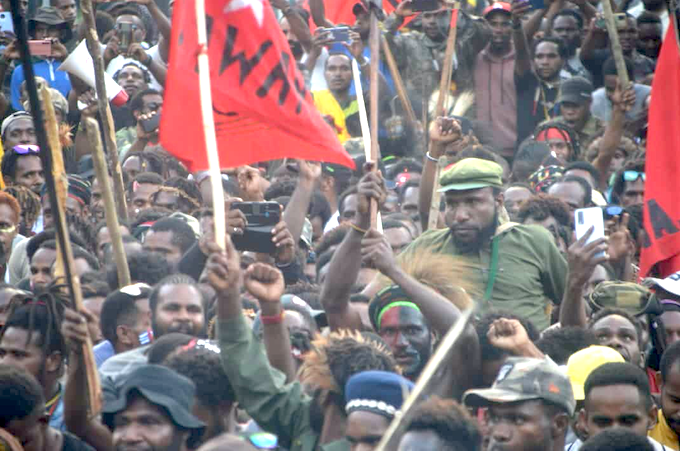
Victor Yeimo’s imprisonment
According to Jubi, a local West Papua media outlet, Victor Yeimo, international spokesperson of the West Papua Committee National (KNPB), was unjustly convicted of treason because he was deemed to have been involved in a demonstration protesting against a racism incident that occurred at the Kamasan III Papua student dormitory in Surabaya, East Java, on 16 August 2019.
He was accused of being a mastermind behind riots that shook West Papua sparked by the Surabaya incident, which led to his arrest and subsequent charge of treason on 21 February 2022.
However, on 5 May 2023, a panel of judges from the Jayapura District Court ruled that Victor Yeimo was not guilty of treason.
Nevertheless, the Jayapura Court of Judges found Yeimo guilty of violating Article 155, Paragraph (1) of the Criminal Code.
The verdict was controversial because Article 155, Paragraph (1) of the Criminal Code was never the charge against Victor Yeimo.
The article used to sentence Victor Yeimo to eight months in prison had even been revoked by the Constitutional Court.
On 12 May 2023, the Public Prosecutor and the Law Enforcement and Human Rights Coalition for Papua, acting as Victor Yeimo’s legal representatives, filed appeals against the Jayapura District Court ruling.
On 5 July 2023, a panel of judges of the Jayapura High Court, led by Paluko Hutagalung SH MH, together with member judges, Adrianus Agung Putrantono SH and Sigit Pangudianto SH MH, overturned the Jayapura District Court verdict, stating that Yeimo was proven to have committed treason, and sentenced him to one year in imprisonment.
Jubi.com stated that the sentence ended, and at exactly 11:17 WP, he was released by the Abepura Prerequisite Board.
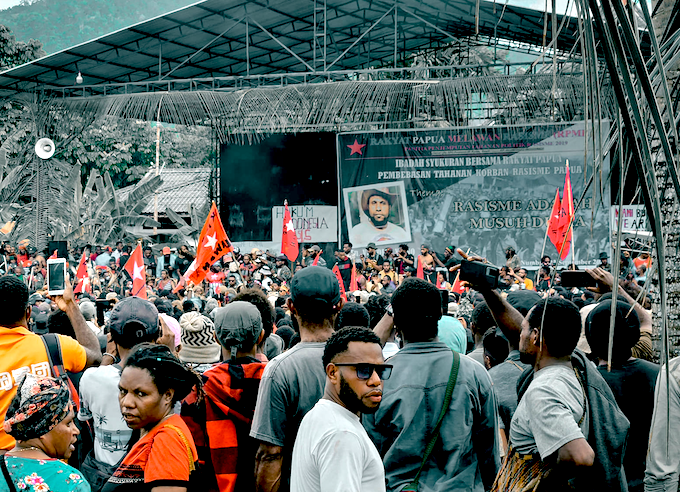
International response
Global organisations, such as Amnesty International and Human Rights Watch have condemned the Indonesian government’s treatment of Papuans and called for immediate action to address the issue of racism.
They have issued statements, conducted investigations, and raised awareness about the plight of Papuans, urging the international community to stand in solidarity with them.
Yeimo’s release brings new hope and strengthens their fight for independence.
His release has not only brought about a sense of relief and joy for his people and loved ones but has also reignited the flames of resistance against the Indonesian occupation.
At the Waena Expo Arena in Jayapura City yesterday, Yeimo was greeted by thousands of people who performed traditional dances and chanted “free West Papua”, displaying the region’s symbol of resistance and independence — the Morning Star flag.
Thousands of Papuans have united, standing in solidarity, singing, dancing, and rallying to advocate for an end to the crimes against humanity inflicted upon them.
Victor Yeimo’s bravery, determination and triumph in the face of adversity have made him a symbol of hope for many. He has inspired them to continue fighting for justice and West Papua’s state sovereignty.
Papuan communities, including various branches of KNPB offices represented by Victor Yeimo as a spokesperson, as well as activists, families, and friends from seven customary regions of West Papua, are joyfully celebrating his return.
Many warmly welcome him, addressing him as the “father of the Papuan nation”, comrade, and brother, while others express gratitude to God for his release.
Yamin Kogoya is a West Papuan academic who has a Master of Applied Anthropology and Participatory Development from the Australian National University and who contributes to Asia Pacific Report. From the Lani tribe in the Papuan Highlands, he is currently living in Brisbane, Queensland, Australia.
